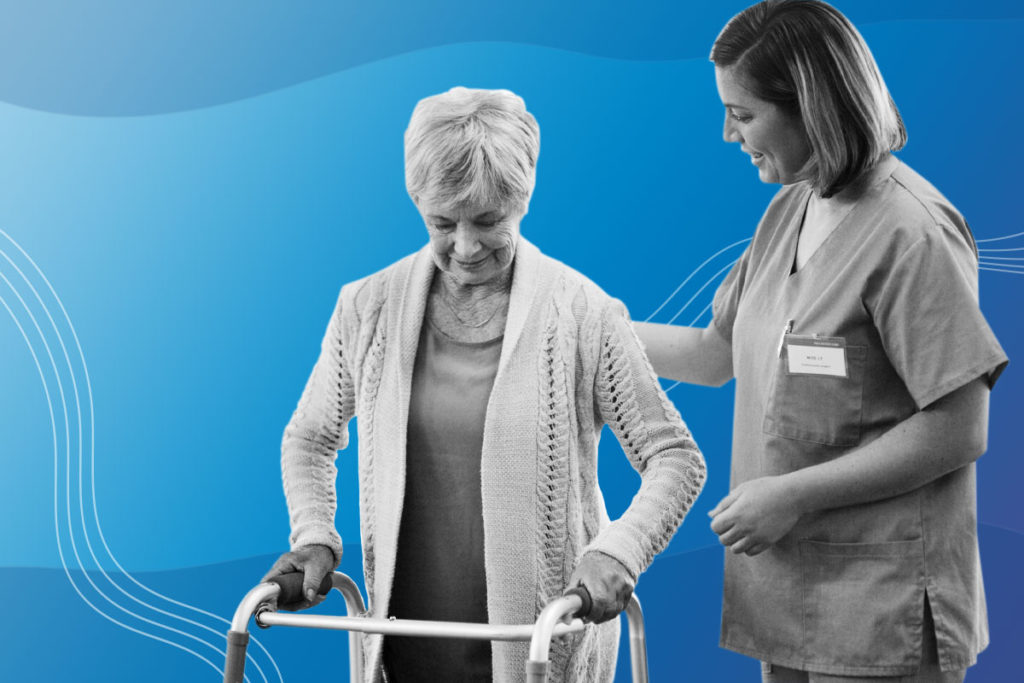
What is Domiciliary Care?
Updated on: January 2023

We begin to cherish our independence as soon as we can crawl. For most of us, this determination to be as self-sufficient as possible becomes even fiercer once we hit puberty.
By the time we get to our twilight years, this need to be self-reliant is already so deeply ingrained in us that we simply do not know any other way to live.
So, the thought of having to leave your home and check into a facility because you are too old to do certain things by yourself just doesn’t go down well with most—if not all—seniors.
That is why domiciliary care service is quickly becoming a popular option for those seniors who want to live at home but need a little assistance with their daily living tasks.
Find What You Need
What is Domiciliary Care?
This is the kind of care provided to the elderly by a qualified home care worker at the senior’s own home. Basically, with domiciliary care service, or “dom care,” you get to live independently at home while someone comes in to help you with your day-to-day living services and certain health care issues such as:
- Dietary needs
- Household chores
- Personal care
- Medication management
- Support with advice and information
- Companionship
- Errands such as doctor visits and other simple healthcare issues
How long the list goes will depend on your specific needs as well as the kind of agreement of services you have with the caregiver.
One of the main reasons why dom care is so important is because you will continue to live in your own home as opposed to moving into a residential care facility but enjoy the benefits of a domiciliary care worker.
The term “domiciliary” stems from the Latin word “Domus” which means “home.” As we have already mentioned, this kind of care varies immensely depending on what the individual care receiver needs. Some seniors will only need a few minutes each day while there are those who will need a caregiver with them around the clock.
Who Needs Domiciliary Care?
Although it is typically associated with older people, domiciliary care is not just for the elderly. This kind of care can be given to young people, children, and even adults who have different care and support needs that require the attention of a professional domiciliary care worker.
The simplest way to learn whether or not you need domiciliary care is to ask yourself a few questions:
- Do you need help or support around the home due to the fact that you are an aging senior or an invalid in recovery?
- Do you need help with getting out of or into bed?
- Do you need help with your daily chores and household tasks such as laundry, cooking, and cleaning?
- Do you need someone to drive to and from doctor appointments?
- Do you need someone to help you manage your medication?
- How about dietary needs? Do you need someone to help you maintain special dietary needs for your health?
- Do you need someone to help you with your personal care and hygiene?
- Do you need someone to see you through physical therapy as you recover at home?
If the answer to any of these questions is yes, then you may need domiciliary care. As mentioned earlier, this kind of care is typically reserved for the elderly but can be offered to anyone who needs it.
The kind of assistance offered by domiciliary caregivers can make a huge difference in the life of the senior receiving the care and in that of the family members related to that senior.
The kind of peace of mind that comes with knowing that a professional caregiver is looking after a loved one is something that most relatives cherish.
What are the Benefits of Domiciliary Care?
Aside from the fact that you get to live in your own home and remain an active and present part of your own community, numerous other benefits come with domiciliary care. These include:
Less Stress
For the most part, a change in environment, as would be necessary as older people are taken to a retirement home or facility, can cause a great deal of stress.
The time it takes the senior to acclimate and find their footing often varies with the kind of connections and social care they make within the facility and just how opposed they are to the move.
Opting for domiciliary care negates all this as the senior remains at home where they are already comfortable and familiar with the surroundings. In this scenario, the caregiver’s integration into the senior’s life can be seamless and thus less stressful for the elderly individual.
Personalized Care
When you receive care in your own home by a dedicated care worker, you get personalized care and service. The care worker is only focused on you as opposed to multiple residents at a time.
You can build a more personal connection with the caregiver and they will get to understand your needs better. This will not only breed trust, but it could lead to a good friendship that helps you enjoy your twilight years.
Tailored Care
As mentioned earlier, the kind of domiciliary care offered varies with every individual. Maybe all you need is a little help running errands during the day or someone to help with your day-to-day household chores.
Or maybe you need more specialized care with recovery or physical therapy due to surgery or some other form of medical procedure that rendered you slightly incapacitated.
The point is, with domiciliary care, you can have the kind of service you receive tailored to your exact needs as opposed to a generic kind of service that might not meet all of your specifications.
It Frees Up Your Family Members
In many cases, it is close family members who end up being the primary caregivers to their aging members. While this might be a noble and loving gesture to at least offer social care, these family members still need to find time for their own lives.
What happens if that family member has an emergency of their own and can’t find a replacement in time? Do you miss your doctor’s appointment on that day? Do you not take your medication?
Hiring domiciliary care is the best way to ensure that you always have help at hand. It frees up your family members and affords them the peace of mind they’ll get knowing that you are well taken care of even when they are not able to do so themselves.
Other benefits may include:
- It provides you with stability
- It offers you improved standards of care
- It is a lot cheaper than moving into a care home
- You get to keep your pets
- It gives you more time to your family members
But, as is the case with every good thing, some drawbacks need to be taken into account as well. Domiciliary care is not an exception to this rule.
What are the Disadvantages of Domiciliary Care?
If truth be told, if you do your due diligence well and hire the right kind of caregiver, the disadvantages of having domiciliary care are almost non-existent.
The best caregivers are not only caring and loving but are professionals who may even be licensed nurses with extensive medical experience.
As you get older, these are people who will come in handy as you begin to need more and more medication as well as qualified care.
That being said, here are some disadvantages that come with hiring domiciliary care:
- You May Not Have 24/7 Care: Unless you decide to go for the 24/7 care package, there is a good chance that you may not have someone around for most of the day. Of course, one of the main benefits of domiciliary care is that you get to decide how much care you need. This, however, can be a disadvantage when you decide to only hire a caregiver for 2 hours out of every 24 hours. The other 22 hours may be spent Isolation and loneliness are deadly at this age.
- You Might Not Get Your Preferred Caregiver Every Day: Things happen and people have emergencies. When your trusted and preferred care worker is not available, the agency will send someone in their stead which means your care continues uninterrupted. This, however, means that you have to get to know someone new. This might prove uncomfortable considering the fact that most of the time you need these people to help with your personal needs.
- There May Be Geographical Limitations: The quality of care you get may be limited by what is available in your immediate geographical This means that in some cases, you may have to settle for a care provider who isn’t as qualified as you would like but is conveniently available. This might lead to some issues later as you begin to get dissatisfied with the kind of care offered as illustrated by the below tweet:
Despite these minor disadvantages, you are still much better off getting domiciliary care. Excellent domiciliary caregivers do much more than just helping out with daily chores such as getting up in the morning, personal hygiene, and meal plans.
They go a step further and provide emotional support. Sometimes all you need is someone to talk to and laugh with as you go about your day.
Sources
- http://www.northerntrust.hscni.net/services/352.htm
- http://www.mycaremyhome.co.uk/your-three-care-options/what-is-domiciliary-care/
- https://www.which.co.uk/elderly-care/housing-options/domiciliary-care/342897-what-is-domiciliary-care
- http://www.carechoices.co.uk/care-information/care-in-your-own-home/

